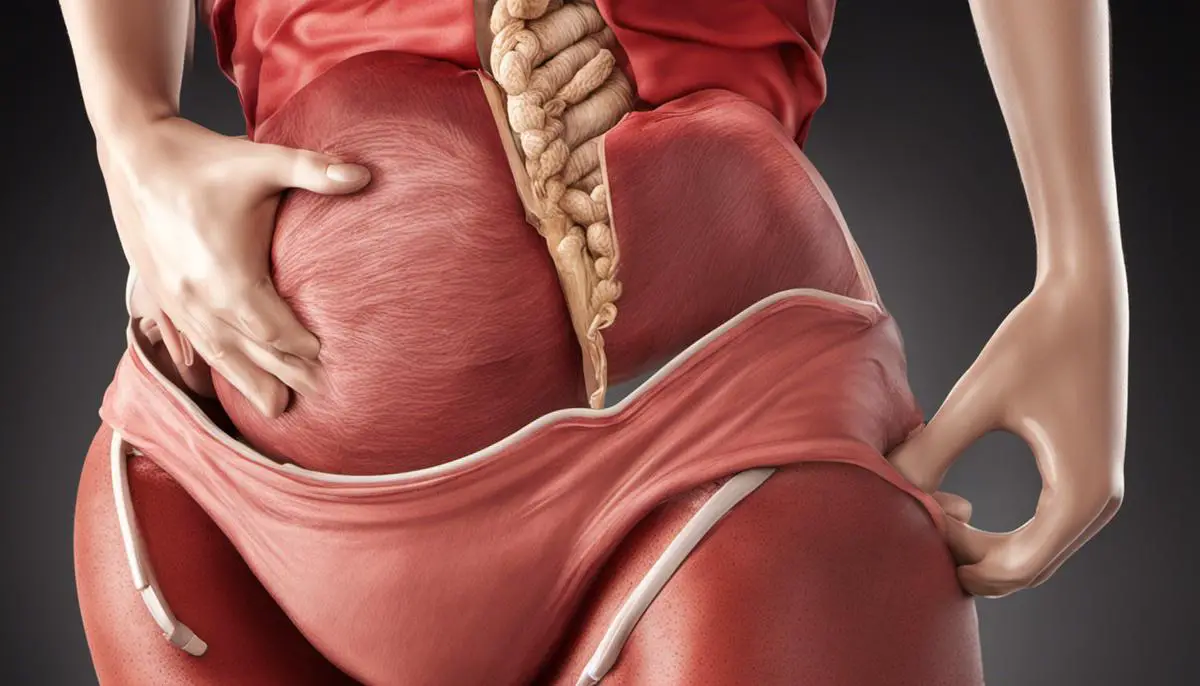Our bodies are finely tuned machines, conducting an intricate symphony of processes that keep us alive and well. One such system, the digestive system, is the cornerstone of our nutrient processing and absorption. A well-functioning digestive system makes for a healthy and active life, which is why disruptions to its processes like constipation and bloating can affect our overall well-being. These two conditions, while seemingly minor, can significantly impact our daily activities, and in some cases, indicate more serious underlying health issues. This article goes beyond the surface, delving into the depths of constipation and bloating – explaining their nature, causes and symptoms, and offering remedies, prevention strategies and treatment options.
Understanding the Basics
Understanding Constipation and Bloating:
Constipation refers to a medical condition where a person has fewer than three bowel movements in a week. It may also relate to scenarios where a person struggles to pass stool or when the stool is hardened. The symptom’s severity may vary, and it often leads to discomfort and bloating.
Bloating, on the other hand, is a sensation of excessive fullness in the abdomen. It’s often linked with a visible increase in stomach size. Bloating can be accompanied by symptoms such as discomfort, flatulence, and burping. It’s usually associated with functional gastrointestinal disorders like constipation and irritable bowel syndrome (IBS).
Key Aspects of Digestion:
Digestion is a biological process where your body processes the food you eat, breaking it down into nutrients and energy. It starts in the mouth, extends to the stomach, proceeds through the small intestines, and concludes in the large intestine or the colon. The waste products of digestion are then excreted through the rectum and anus.
Peristalsis, the wave-like movement of muscles in your gut, helps with movement of food and waste. Factors like changes in diet, lack of physical activity, diabetes, stress, certain medications, and aging can slow down the process of peristalsis, which can lead to constipation.
The Link Between the Digestive System and Constipation:
In a fully functioning digestive system, the stool is broken down in the colon, and the water is absorbed by the body, leaving behind semi-solid feces. When bowel movements are infrequent, the stool starts collecting in the colon and rectum. This may cause the colon to absorb too much water, resulting in hard stool that is difficult to pass.
If a person experiences chronic constipation, it can lead to fecal impaction, a condition where stool becomes hard and lodged in the colon or rectum. This can lead to severe bloating and discomfort.
An Introduction to Medical Terms Related to Constipation and Bloating:
An essential term to become familiar with is IBS or Irritable Bowel Syndrome, a prevalent disorder impacting the large intestines. Usual symptoms often comprise of cramping, abdominal discomfort, a swollen belly, and variations in bowel habit such as constipation or diarrhea.
Another noteworthy term is Gastroparesis, an ailment where the stomach is unable to properly evacuate food. This condition can result from nerve damage due to diseases like diabetes or certain surgical procedures, and it may bring about symptoms like distension, nausea, and constipation.
Dysbiosis is yet another crucial term, referring to a microbial imbalance within the body, predominantly in the stomach and intestines. This can affect the frequency and consistency of bowel movements, potentially causing constipation and bloating.

Symptoms and Complications
Identifying the symptoms of Constipation and Bloating:
Although constipation and bloating are two separate conditions, they often intertwine, triggering discomfort and potentially obstructing daily tasks. When it comes to constipation, the major indicators involve irregular bowel movements usually less than three times a week, passing hard or lumpy stools, straining during bowel movements, and experiencing a feeling that the bowels are not completely empty.
Whereas, bloating typically becomes apparent as a noticeable swelling or expansion in the abdominal area. This is often partnered with sensations of fullness, tightness, or discomfort in the stomach. Other associated symptoms can include abdominal pain, belching, and an over-production of gas.
Interlink Between Constipation and Bloating
Often, both constipation and bloating go hand in hand. Constipation can lead to bloating as the lengthened transit time in the intestinal tract can result in excessive gas production. Meanwhile, bloating can exacerbate constipation if it affects motility, or the movement of muscles in the digestive tract.
Complications of Untreated Symptoms
If left untreated, constipation and bloating have the potential to lead to severe complications. Chronic constipation could potentially lead to hemorrhoids, anal fissures, or rectal prolapse, where a section of the rectum slips outside the anus. In rare cases, it can lead to fecal impaction, or a hard mass of stool that gets stuck in the colon or rectum, requiring medical intervention. Long-term bloating might indicate serious digestive disorders, like irritable bowel syndrome (IBS), inflammatory bowel disease, or even cancer.
The Urgency for Treatment
Given the potential implications of prolonged constipation and bloating, it is essential to seek medical attention when symptoms persist. The frequency and consistency of bowel movements can vary widely, so what’s considered “typical” will differ across different individuals. However, if constipation lasts for over a few weeks, or if there is sudden-worsening abdominal pain or bloating, medical guidance should be sought without delay to prevent complications and address potential underlying problems.
Addressing Constipation and Bloating through Lifestyle Adjustments
The alleviation of constipation and bloating often requires a multifaceted approach, inclusive of lifestyle improvements alongside treatments for immediate relief. This involves incorporating fiber-rich foods and ensuring adequate hydration, engaging in regular physical activities, and forming a predictable bowel schedule. Recognizing and eliminating specific foods or beverages that may exacerbate bloating could also prove beneficial in managing the symptoms. It’s noteworthy that professional health advice should be sought before implementing any radical changes in diet or daily routines.

Causes and Risk Factors
Unveiling the Connection Between Lifestyle, Dietary Choices, and Digestive Health
The onset of constipation is often traced back to a physically inactive lifestyle. Regular physical activity promotes faster movement of food in your colon. Similarly, a diet low in fiber and inadequate water intake are significant contributors to constipation. The body uses water to soften the food within the colon, leading to softer, more voluminous stools that pass through with ease. A deficiency in fiber or water can make your stool hard and obstructive, causing constipation.
In the case of bloating, it can be attributed to rapid consumption of food or gulping large amounts of air while eating or drinking. Regularly indulging in high-fat or processed foods, fizzy beverages, artificial sweeteners, or even certain gas-producing vegetables such as broccoli and cabbage, can trigger bloating.
Stress Factors
An often-overlooked cause of constipation and bloating is stress. Stress can disrupt regular bowel movements, leading to constipation. Likewise, anxiety may cause an individual to breathe more rapidly, swallowing more air in the process, which can result in bloating. Pressure on the abdomen caused by stress may also cause bloating.
Medical Conditions
Certain underlying medical conditions can also contribute to bloating and constipation. Conditions affecting the colon, such as Irritable Bowel Syndrome (IBS), Inflammatory Bowel Disease (IBD), and certain neurological disorders like Parkinson’s disease, Multiple Sclerosis, or stroke, have constipation as a common symptom.
For bloating, a vast range of gastrointestinal issues like gastroenteritis, gastric reflux, peptic ulcers, food intolerances, allergies, Celiac disease, or even hormonal changes, can contribute to bloating.
Prescription Drugs
Various prescription drugs list constipation and bloating as potential side effects. These include some antidepressants, opioids, certain antacids, blood pressure medications, and some iron supplements. If you’ve recently started any new medication and are experiencing constipation or bloating, it may be worthwhile to discuss these side effects with your healthcare provider.
Risk Factors for Constipation and Bloating
Varied risk factors can contribute to the likelihood of experiencing constipation and bloating. Age plays a significant part in the increase of these conditions, with the functionality of the digestive system gradually diminishing as we grow older. Women, particularly those who are pregnant or post-menopausal, tend to be at greater risk compared to men. Furthermore, those experiencing mental health challenges such as depression or eating disorders tend to have more incidents of constipation and bloating.
Individual habits also come into play as risk factors. Chronic avoidance of bowel movements when the body signals the need can result in constipation over time. Overconsumption of food, even past the point of satiety, primarily if those foods are high in sodium or processed, can trigger bloating.

Photo by johnarano on Unsplash
Prevention and Home Remedies
Comprehending Constipation and Bloating
Constipation involves either infrequent or challenging bowel movements and often results in discomfort when attempting to pass stool, straining, and a sensation of incomplete evacuation. On the flip side, bloating presents as a feeling of fulness or tightness in the abdominal area, often coupled with gas. These two conditions frequently co-occur and can significantly reduce the individual’s quality of life.
Dietary Changes for Constipation and Bloating Relief
One of the most recommended changes to prevent and manage constipation and bloating is modifying your diet. Adequate intake of dietary fiber from fruit, vegetables, beans, and whole grains can promote regular bowel movements by softening the stool and adding bulk to it. This makes the stool easier to pass and reduces the risk of constipation. Pairing high-fiber foods with plenty of fluids — ideally water — is important, as fiber absorbs water, which further aids in feces formation and movement.
On the other hand, bloating can often be exacerbated by certain types of foods and drinks, such as carbonated beverages, beans, lentils, broccoli, cabbage, onions, and foods high in fat and sugar. Eating these foods in moderation or finding alternatives can significantly relieve bloating. Additionally, smaller, more frequent meals are easier on the digestive system and can reduce the risk of bloating and discomfort.
Physical Activity and Posture
Regular physical activity and exercise are also beneficial in managing constipation and bloating. Exercises like walking, yoga, or swimming stimulate the digestive tract, which helps move stools more easily through the colon. Applying mild pressure or massaging the lower abdomen can also provide some relief from bloating.
Consider your posture when using the toilet as well. Using a small stool to lift your legs into a squatting position can help align the rectum and anus, making it easier to pass stool and potentially lessen the time spent on the toilet, thereby reducing the risk of hemorrhoids or other complications associated with long-term constipation.
Home Remedies
Certain over-the-counter supplements such as probiotics, which are beneficial bacteria that promote gut health, could also help manage constipation and bloating. Additionally, plant-based natural remedies like ginger, peppermint, and fennel seeds have been found to soothe the digestive tract and aid with bloating and gas.
Take Notice of Persistent Symptoms
Preventive measures and home remedies may help with constipation and bloating, but if these symptoms persist, they could be indicating an underlying condition that warrants attention. Conditions such as Irritable Bowel Syndrome (IBS), Crohn’s disease, bowel obstruction, or even cancer could be causing constant constipation and bloating. Therefore, if your symptoms continue, ensure to consult with a medical professional for further evaluations and an appropriate treatment plan.

Treatment and When to Seek Medical Help
Medical Interventions for Constipation and Bloating
A combination of lifestyle modifications and medications, whether over-the-counter or prescribed, are often effective in the treatment of constipation and bloating. The common over-the-counter remedies usually consist of fiber supplements, stool softeners, laxatives, and antacid medicines.
Fiber supplements are beneficial as they add bulk to the stool so it can move more easily through your intestines. Stool softeners work by hydrating the stool, facilitating easier passage. Laxatives, on the other hand, stimulate your intestines to promote the movement and expulsion of stools. These remedies are typically more suitable for immediate, short-term relief.
If these treatments prove ineffective, doctors may recommend prescription drugs for chronic or long-term constipation. Drugs such as lubiprostone (Amitiza), linaclotide (Linzess), plecanatide (Trulance), among others, can help by increasing the fluid content in your gut, consequently making bowel movements easier and potentially more regular.
Medical Procedures for Chronic Constipation and Bloating
Some cases of persistent abdominal bloating and chronic constipation may require measures beyond medication. Biofeedback therapy is a less invasive method that helps you retrain your pelvic muscles, which can aid in bowel movement if constipation is the result of improper functioning of these muscles.
More severe cases might require surgical intervention. An example of this is a colectomy, the process of surgically removing a part of the colon causing the problems. This procedure is used as a last resort when all other treatments have failed.
Diagnostic Tests for Constipation and Bloating
If your constipation or bloating is persistent, your primary care provider may recommend diagnostic tests to identify or rule out possible causes. This could include a blood test to check your hormone levels, a colonoscopy or sigmoidoscopy to visualize your lower bowel, or imaging tests such as a barium enema or abdominal x-ray.
When to Seek Medical Help for Constipation and Bloating
While occasional constipation or bloating is common and usually not a cause for concern, there are instances when you should consult a healthcare provider without delay. These include: if constipation or bloating persists for several weeks, if there is blood in your stools, unintended weight loss, severe or worsening abdominal pain, or significant changes in your bowel habits.
In addition, if your symptoms do not improve with over-the-counter treatments or lifestyle changes, or if you have a family history of digestive diseases or colorectal cancer, consultation with a medical professional is recommended.
While constipation and bloating might not seem like alarming conditions at first, chronic or severe symptoms can be indications of underlying health problems. Therefore, knowing when to seek medical help and understanding the available treatments is crucial.

Photo by towfiqu999999 on Unsplash
When it comes to constipation and bloating, understanding is the key to managing and preventing them. Knowledge about the causes, symptoms, risk factors, and potential complications strengthens your hand in dealing with these uncomfortable conditions. On one hand, lifestyle adjustments and home remedies might be sufficient to manage mild to moderate cases. On the other hand, in cases where these methods fail or the condition is exacerbated, medical intervention becomes necessary. Whether it’s dietary adjustments, adopting a new exercise regimen, or seeking medical help, remember that taking the initiative for your health is crucial. Invest time and effort in understanding your body, for, in the end, it’s the understanding of our bodies that paves the way toward health and wellness.
